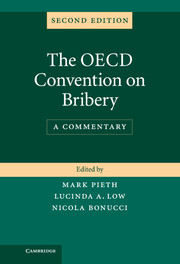Book contents
- Frontmatter
- Contents
- Notes on Contributors
- Foreword
- Acknowledgements
- Abbreviations
- Part I Introduction
- Part II Commentary
- Article 1 The Offence of Bribery of Foreign Public Officials
- Article 2 The Responsibility of Legal Persons
- Article 3 Sanctions
- Article 3(3) Seizure and Confiscation
- Article 4 Jurisdiction
- Article 5 Enforcement
- Article 6 Statute of Limitations
- Article 7 Money Laundering
- Article 8 Accounting
- Articles 9–11 International Co-operation
- Article 12 Monitoring and Follow-up
- Articles 13–17 Final Provisions
- Part III The Convention in Practice
- Annex OECD Documents
- Consolidated Bibliography
- Index
- References
Article 8 - Accounting
from Part II - Commentary
Published online by Cambridge University Press: 05 March 2015
- Frontmatter
- Contents
- Notes on Contributors
- Foreword
- Acknowledgements
- Abbreviations
- Part I Introduction
- Part II Commentary
- Article 1 The Offence of Bribery of Foreign Public Officials
- Article 2 The Responsibility of Legal Persons
- Article 3 Sanctions
- Article 3(3) Seizure and Confiscation
- Article 4 Jurisdiction
- Article 5 Enforcement
- Article 6 Statute of Limitations
- Article 7 Money Laundering
- Article 8 Accounting
- Articles 9–11 International Co-operation
- Article 12 Monitoring and Follow-up
- Articles 13–17 Final Provisions
- Part III The Convention in Practice
- Annex OECD Documents
- Consolidated Bibliography
- Index
- References
Summary
Accounting
In order to combat bribery of foreign public officials effectively, each Party shall take such measures as may be necessary, within the framework of its laws and regulations regarding the maintenance of books and records, financial statement disclosures, and accounting and auditing standards, to prohibit the establishment of off-the-books accounts, the making of off-the-books or inadequately identified transactions, the recording of non-existent expenditures, the entry of liabilities with incorrect identification of their object, as well as the use of false documents, by companies subject to those laws and regulations, for the purpose of bribing foreign public officials or of hiding such bribery.
Each Party shall provide effective, proportionate and dissuasive civil, administrative or criminal penalties for such omissions and falsifications in respect of the books, records, accounts, and financial statements of such companies.
Official Commentaries
Article 8 – Accounting
Article 8 is related to section V of the 1997 OECD Recommendation, which all Parties will have accepted and which is subject to follow-up in the OECD Working Group on Bribery in International Business Transactions. This paragraph contains a series of recommendations concerning accounting requirements, independent external audit and internal company controls the implementation of which will be important to the overall effectiveness of the fight against bribery in international business. However, one immediate consequence of the implementation of this Convention by the Parties will be that companies which are required to issue financial statements disclosing their material contingent liabilities will need to take into account the full potential liabilities under this Convention, in particular its Articles 3 and 8 , as well as other losses which might flow from conviction of the company or its agents for bribery. This also has implications for the execution of professional responsibilities of auditors regarding indications of bribery of foreign public officials. In addition, the accounting offences referred to in Article 8 will generally occur in the company's home country, when the bribery offence itself may have been committed in another country, and this can fill gaps in the effective reach of the Convention.
- Type
- Chapter
- Information
- The OECD Convention on BriberyA Commentary, pp. 447 - 485Publisher: Cambridge University PressPrint publication year: 2013



